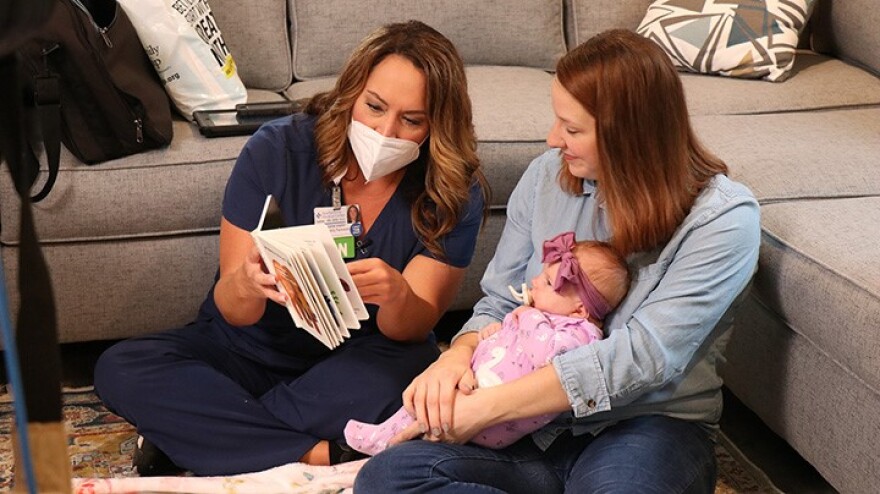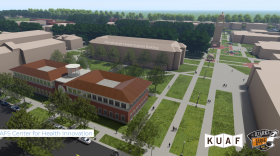Families are moving away from multi-generational households to more isolated dwellings. Traditionally, family members used to help new moms with babies and are usually monitoring for dangerous postpartum symptoms. The newer trend, paired with health and social disparities, has propelled the maternal death crisis, as previously reported by ACHI's Dr. Joe Thompson, to new heights.
The Arkansas Department of Health worked with Nurse-Family Partnership, a national program that centers around providing support to mothers, helping them navigate the journey from pregnancy to motherhood. Brittany McAllister is the senior government affairs manager for the partnership, and she says they use registered nurses who have at least a bachelor's degree to work with first-time mothers.
[They] are low income, early in their pregnancy until their baby turns two years old. And so we're intervening with moms who are looking to get the help they need to have a healthy pregnancy become a caring and trusted parent. So Nurse Family Partnership is a model that is evidence based on 45 years of research, showing that it makes a difference in the lives of moms and their children not only during the program, but for generations to come.Brittany McAllister, Senior Government Affairs Manager for Nurse-Family Partnership
One of the first things that comes to mind with a program like this are the obvious questions: how much does it cost? Who is paying for it? Brittany says the program is at no cost to families.
"It's entirely publicly funded through a variety of federal and state funding sources. And now there's a new opportunity in Arkansas to fund it through Medicaid as well," McAllister said.
Brittany says one solution their program uses for combatting high death rates and serious health conditions—specifically with maternal mortality—is that they focus on healthcare workers coming to mothers, not the other way around.
"One thing that shines about our program is that those home visits are provided regardless that the mother doesn't need to obtain transportation or childcare," McAllister said. "We can come out to her home or wherever she may be to provide those services. And nurses remain the number one most trusted profession in America year after year. And so having nurses not only helps build that trusting relationship, but they're also able to bring their clinical skills to monitor those prenatal conditions that might lead to risk for a bad outcome during birth or after birth for the mom or the baby."
Brittany says their research shows that they have improvements in both preterm and low-weight babies. The objective of this care is not to replace traditional pediatric visits or OB visits postpartum.
"We're helping them advocate for themselves that their visits are helping them understand the importance of going to those visits, and even helping them connect to services, if they do need transportation or childcare, to be able to do those things to take care of themselves and their babies, we can help arrange that as well."Brittany McAllister

The program, implemented in over 40 states, has served more than 1,500 families in Arkansas since 2011. Regina Vittore, a nursing manager for Nurse-Family Partnership in the state, says that the program centers around high-risk clients and helps bridge the gap between underserved communities and accessing quality healthcare.
What support that client needs at that moment. And supports that client doesn't really tell the client What to do, but lets the client choose their direction and then provides resources and support at a population that's being served that they can serve to our current implementation in Arkansas can serve 200 families, - which is looking at 2022 data, the population is 75%. Black. And we know that black women have a three times higher mortality rate in that maternal period than anybody else. So just right off the bat, they're high risk, doesn't matter what they do with their income is high risk immediately.Regina Vittore, Nursing Manager for Nurse-Family Partnership
Regina says that one of the main concerns that nurses, who work with families, point to is little access to health, financial, and community services: especially in counties that are maternity care deserts. The connection between nurse and client helps combat the mistrust in the healthcare system - mistrust that leads to dangerous outcomes for moms.
"That moment, that connection where a nurse gets to talk to a mom, we serve our highest risk moms," Vittore said. "They are homeless, they are substance using, they have had generations of trauma, they are distrustful of our community resources or hospital systems, they have not had good experiences. And so to be able to ask questions and to feel seen and heard by a health professional, and to be able to trust the information and then implement change in their life so that they can have a healthy baby, they can have some child development skills. That is where the good stuff of this program happens."
Nurses fill all kinds of roles, says Brittany.
"Our nurses are really educators, their social workers and their nurses, they really mix all of those services into one. And that's really why our program is so successful, and why we really want to see it reach more Arkansas moms."Brittany McAllister
You can find more information about Nurse-Family Partnership here.








